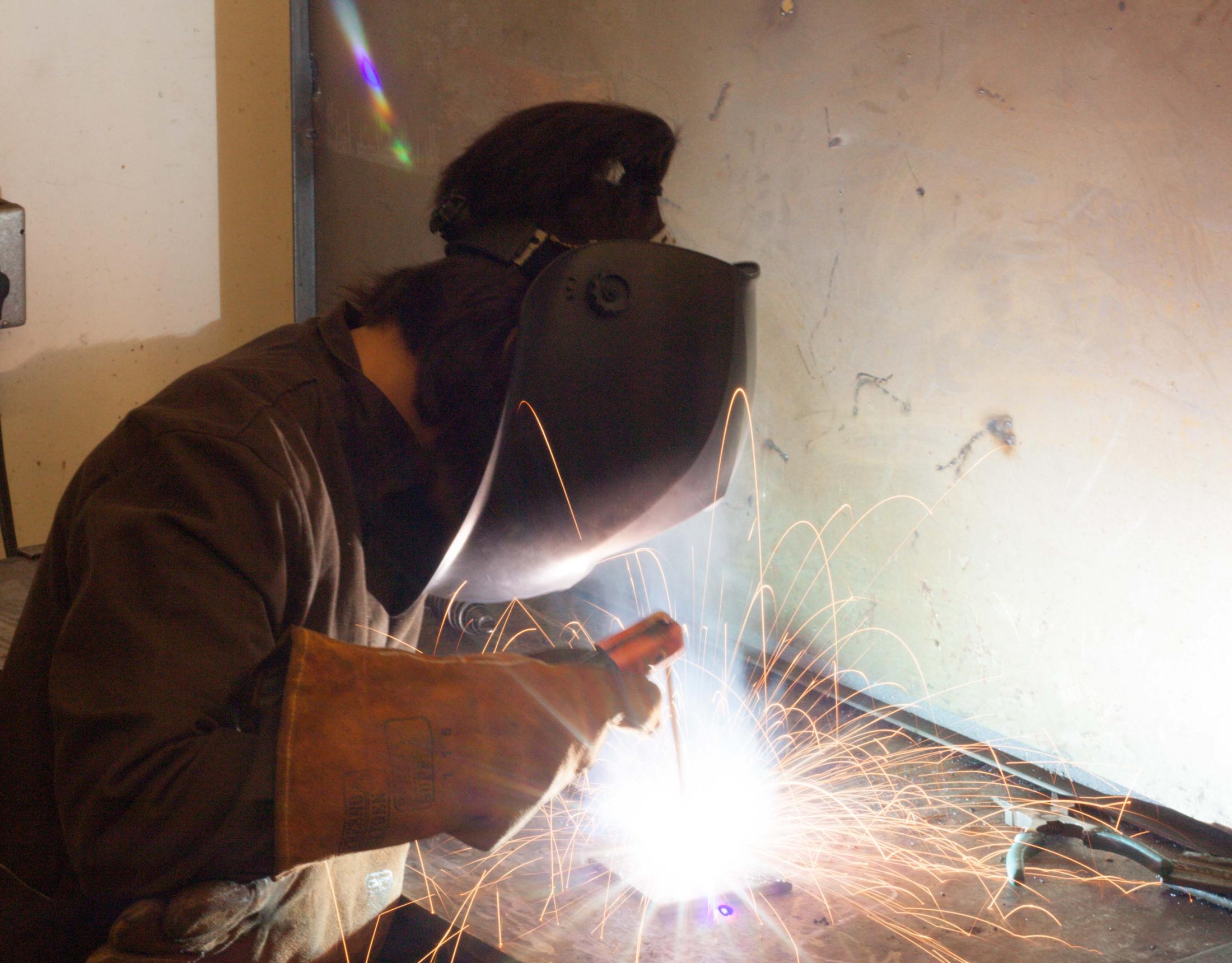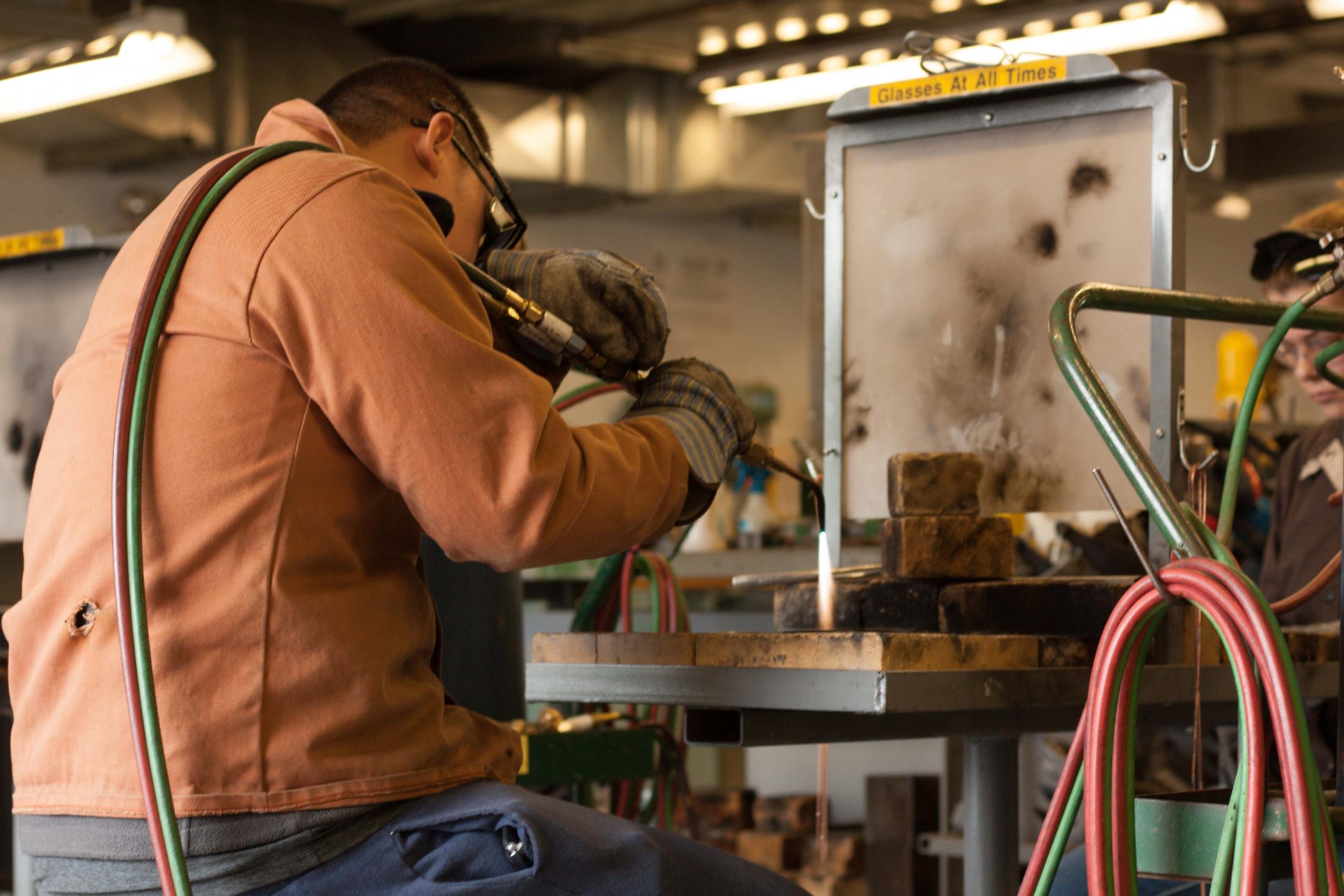Applied Biological Systems Technology
ABT stands for Applied Biological Systems Technology, where students have the opportunity to be a part of a variety of hands-on courses.
These courses are open to any student regardless of their major, giving them the chance to learn the fundamentals of metal and wood properties and fabrication, tractor driving, field implements operation, and small farm technology and equipment.
Whether students are discovering their passion for welding or woodworking and advancing it into a career, or understanding how to operate field equipment in order to work on a farm of any kind, ABT courses have the potential to help to shape student’s academic and career paths.
The courses are also in an exciting learning environment that allows students to take a break from the books and apply their knowledge in a proactive manner.
Courses
ABT 15- Wood Properties and Fabrication (2): Lecture/Discussion—1 hour(s); Laboratory—3 hour(s). This course is an introduction in the use of wood hand and power tools and how to use them safely to construct a variety of projects. Students will learn about wood properties including the definition of and the difference between hard vs. soft, engineered vs. dimensional, grades and dimensions. (P/NP grading only.) GE credit: OL, QL, SE, VL. Effective: 2010 Fall Quarter.

ABT 16- Metal Properties and Fabrication (2): Lecture—1 hour(s); Laboratory—3 hour(s). This hands-on course introduces students to various cold and hot metalworking procedures, tools, and equipment. Additionally, students learn MIG, Stick, and Oxy-Acetylene welding and cutting techniques. The course also covers fundamental knowledge including various types of metals and their properties as concerns to welding and their use in metal fabrication shops. (P/NP grading only.) GE credit: QL, SE, VL. Effective: 1997 Spring Quarter.
ABT 17- Plastic Properties and Fabrication (2): Lecture--1 hour; Laboratory--3 hours. Study of the properties of plastic materials and the fundamentals of fabrication techniques. Experience in working with common plastics, with applications to biological systems. (P/NP grading only.) GE credit: QL, SE, VL. Effective: 1997 Winter Quarter.
ABT 49- Field Equipment Operation (2): Lecture—1 hour(s); Laboratory—3 hour(s). Students will learn about the different types, components, operation, adjustment, and troubleshooting of farm tractors and field equipment. Students gain a foundational knowledge for the use of tractors in the field of agriculture and cropping practices. The course also develops students' understanding of equipment terminology, such as proper uses of tilling, cultivating, thinning, and planting equipment. This hands-on course allows students to get behind the wheel of tractors and engage in handling tractor operated implements. (P/NP grading only.) GE credit: QL, SE, VL. Effective: 1997 Spring Quarter.
ABT 52- Field Equipment Welding (2): Lecture—1 hour(s); Laboratory—3 hour(s). Prerequisite(s): ABT 016; or Consent of Instructor. This course requires the basic understanding of metal properties and welding techniques learned from ABT 16. This intermediate welding class extends the students’ welding skills and introduces TIG Welding, hard facing, and plasma cutting techniques, as well. Class projects revolve around repair and fabrication by welding, troubleshooting and major repair of field equipment. (P/NP grading only.) GE credit: QL, SE, VL. Effective: 2000 Winter Quarter.
ABT 98—Directed Group Study (1-5): Variable—1-5 hour(s). Prerequisite(s): Consent of Instructor. (P/NP grading only.) GE credit: SE. Effective: 1997 Winter Quarter.
ABT 099—Special Study for Lower Division Students (1-5): Variable. Prerequisite(s): Consent of Instructor. (P/NP grading only.) GE credit: SE. Effective: 1997 Winter Quarter.
ABT 101—Engine Technology (3): Lecture—2 hour(s); Laboratory—3 hour(s). Prerequisite(s): Upper division standing or consent of instructor. Principles of 2-stroke cycle, 4-stroke cycle gasoline and 4-stroke cycle diesel engine construction and operation. Engine systems, performance, troubleshooting, and overhaul. GE credit: QL, SE, VL. Effective: 2000 Winter Quarter.
ABT 110L—Experiments in Food Engineering (2): Laboratory—6 hour(s). Prerequisite(s): FST 110B (can be concurrent). Use of temperature sensors; measurement of thermal conductivity and heat transfer in foods; refrigeration, freezing, concentration and dehydration of foods. GE credit: QL, SE, VL, WE. Effective: 1997 Spring Quarter.
ABT 121—Animal Housing and Environment Management (2): Lecture—2 hour(s). Prerequisite(s): ANS 001 or ANS 002. Optimal structures and environments for animal growth and comfort; heat and moisture transfer principles; heating, cooling, ventilating principles and equipment; animal housing design; environmental regulations and waste management practices. GE credit: SE. Effective: 1997 Spring Quarter.
ABT 142- Equipment and Technology for Small Farms (2): Lecture—1 hour(s); Laboratory—3 hour(s). This course stresses the different types and characteristics of farming equipment and technologies that are appropriate for small farm operations. The students have the opportunity to familiarize themselves with day-to-day farming processes, such as tractor operation and maintenance, land preparation, planting, irrigation crop protection and management, harvesting, and post harvesting techniques. (Same course as IAD 142.) GE credit: QL, SE, VL. Effective: 1997 Spring Quarter.
ABT 150—Introduction to Geographic Information Systems (4): Lecture—3 hour(s); Laboratory—3 hour(s). Pass One restricted to Landscape Architecture and Sustainable Environmental Design majors. Basic concepts, principles, and methods of GIS are presented. Data structures, database design, GIS data creation, GPS, and spatial analysis. Not open for credit to students who have completed ABT 180/PLS 180 or ABT 181N. (Same course as LDA 150.) GE credit: SE, VL. Effective: 2018 Winter Quarter.
ABT 161—Water Quality Management for Aquaculture (3): Lecture—3 hour(s). Prerequisite(s): BIS 001B; MAT 016B; CHE 002B. Basic principles of water chemistry and water treatment processes as they relate to aquacultural systems. GE credit: QL, SE, SL, VL. Effective: 1997 Spring Quarter.

ABT 163—Aquaculture Systems Engineering (3): Lecture—3 hour(s). Prerequisite(s): ABT 161. Design of aquacultural systems: design methodology, principles of fluid mechanics, site selection and facility planning, management operations, computer modeling. GE credit: OL, QL, SE, SL, VL, WE. Effective: 1997 Spring Quarter.
ABT 165—Irrigation Practices for an Urban Environment (2): Lecture—2 hour(s). Prerequisite(s): PHY 001A. Basic design, installation, and operation principles of irrigation systems for turf and landscape: golf courses, parks, highways, public buildings, etc. Emphasis on hardware association with sprinkler and drip/trickle systems. GE credit: QL, SE, VL. Effective: 1997 Spring Quarter.
ABT 181N—Concepts and Methods in Geographic Information Systems (4): Lecture/Lab—8 hour(s). Prerequisite(s): ABT 150; LDA 150; or Consent of Instructor. Data representation and analysis in geographic information systems (GIS). Creation of spatial data sets from analog and digital sources such as aerial photography and maps; data structures, data management, database design, georeferencing, georectification, surface models, analysis, and spatial data visualization. GE credit: SE, SL, VL. Effective: 2018 Winter Quarter.
ABT 182—Environmental Analysis Using GIS (4): Lecture—2 hour(s); Laboratory—4 hour(s). Prerequisite(s): ABT 150 or LDA 150; Or equivalent GIS experience and skills; general biology and/or ecology courses are recommended. Ecosystem and landscape modeling with emphasis on hydrology and solute transport. Spatial analysis of environmental risk analysis including ecological risk assessment, natural resource management. Spatial database structures, scripting, data models, and error analysis in GIS. (Same course as HYD 182.) GE credit: QL, SE, SL, VL. Effective: 2018 Winter Quarter.
ABT 190C—Research Conference for Advanced Undergraduates (1): Discussion—1 hour(s). Prerequisite(s): Consent of Instructor. Research conferences for specialized study in applied biological systems technology. May be repeated for credit. May be repeated for credit. (P/NP grading only.) GE credit: SE. Effective: 1997 Winter Quarter.
ABT 192—Internship in Applied Biological Systems Technology (1-5): Internship—3-15 hour(s). Prerequisite(s): Consent of Instructor. Upper division standing; approval of project prior to period of internship. Supervised internship in applied biological systems technology. May be repeated for credit. May be repeated for credit. (P/NP grading only.) GE credit: SE. Effective: 1997 Winter Quarter.
ABT 197T—Tutoring in Applied Biological Systems Technology (1-5): Tutorial. Prerequisite(s): Consent of Instructor. Upper division standing. Tutoring individual students, leading small voluntary discussion groups, or assisting the instructor in laboratories affiliated with one of the department's regular courses. May be repeated for credit if topic differs. (P/NP grading only.) GE credit: SE. Effective: 2004 Spring Quarter.
ABT 198—Directed Group Study (1-5): Variable. Prerequisite(s): Consent of Instructor. (P/NP grading only.) GE credit: SE. Effective: 1997 Winter Quarter.
ABT 199—Special Study for Advanced Undergraduates (1-5): Variable. Prerequisite(s): Consent of Instructor. (P/NP grading only.) GE credit: SE. Effective: 1997 Winter Quarter. 
ABT 212—Path to Zero Net Energy (4) Review all entries: Lecture—3 hour(s); Term Paper/Discussion—1 hour(s). Prerequisite(s): EBS 216; or Consent of Instructor. Open to upper division or graduate students. Zero Net Energy concepts and social, technical, economic, and environmental considerations. Multidisciplinary research and analysis for clients. Effective: 2017 Fall Quarter.
ABT 212—Path to Zero Net Energy (4) Review all entries: Lecture—3 hour(s); Term Paper/Discussion—1 hour(s). Prerequisite(s): Consent of Instructor. Open to upper division or graduate students. Zero Net Energy concepts and social, technical, economic, and environmental considerations. Multidisciplinary research and analysis for clients. Effective: 2018 Fall Quarter.
ABT 233—Pest Control Practices (3): Lecture—2 hour(s); Laboratory—3 hour(s). Prerequisite(s): Graduate standing or consent of instructor. Practical and theoretical considerations of pest control systems and techniques. Design, selection, and use of mechanical systems for field, orchard, greenhouse, and vector control use. Biological, legal, and environmental considerations in pest control and pesticide application. Effective: 2001 Winter Quarter.
ABT 289A—Selected Topic in Applied Biological Systems Technology: Agricultural and Natural Resources (1-5): Variable—1-5 hour(s). Prerequisite(s): Consent of Instructor. Special topic. May be repeated for credit. Effective: 2015 Fall Quarter.
ABT 289B—Selected Topics in Applied Biological Systems Technology: Biotechnology (1-5): Variable—1-5 hour(s). Prerequisite(s): Consent of Instructor. Special topic. May be repeated for credit. Effective: 2015 Fall Quarter.
ABT 289C—Selected Topics in Applied Biological Systems Technology: Food Technology (1-5): Variable—1-5 hour(s). Prerequisite(s): Consent of Instructor. Special topic. May be repeated for credit. Effective: 2015 Fall Quarter.
ABT 290C—Graduate Research Conference (1): Discussion—1 hour(s). Prerequisite(s): Consent of Instructor. Research problems, progress, and techniques in applied biological systems technology. May be repeated for credit. May be repeated for credit. (S/U grading only.) Effective: 1997 Winter Quarter.
ABT 298—Group Study (1-5): Variable. Prerequisite(s): Consent of Instructor. (S/U grading only.) Effective: 1997 Winter Quarter.
ABT 299—Research (1-12): Variable. Prerequisite(s): Consent of Instructor. (S/U grading only.) Effective: 1997 Winter Quarter.
ABT 317—Teaching Agricultural Mechanics: This upper-division class prepares agriculture student teachers with the foundational skills of agricultural mechanics and ensures that they are adequately prepared to manage a class in a shop setting. They conduct their lesson plans and give presentations in order to prepare for this process.

